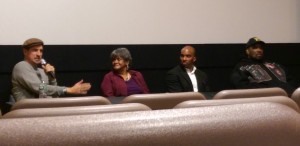When I read the description of the movie, I assumed it was going to be set in the 90s and wasn’t too sure how I would like it, but it was good movie. The whole story focuses on Malcom, a geekier character from a bad neighborhood and school who wants to get into Harvard. Overall, the beginning of the film did a good job of showing just how much he didn’t fit in with his community. From the way he got special treatment from the security guard at school to the decision of dealing with the bloods beating someone up or the drug dealers while just trying to go home from school.
While Malcom is portrayed as an atypical male lead with his high-top fade, I was glad that his group of other outsider friends was not too weird. Some movies like to over exaggerate what makes certain characters outsiders, but I thought these characters were authentic and just trying to deal with their lives as normally as possible.
Despite the friends being pretty normal, Malcom was still portrayed as a socially awkward nerd. To be fair, I thought that there was good comedic timing, but having a nerdy high school guy who is sexually frustrated and has a hard time not focusing on girls is really played out. Also, while it’s sort of expected that the nerdy guy gets the girl in the end for being himself, it wouldn’t hurt for a nerdy coming of age story not to involve overcoming a romantic hurdle.
What I find interesting is how Malcom and his friends dealt with the situation they were put in. I thought about what I would do if somehow I was suddenly entangled with drugs and having a college interviewer know about it. While I understand it would have been a boring movie if he just dumped them and that was the end of it, the story line was a bit far-fetched.
That’s not to say I didn’t appreciate the twist; I actually thought it was a really good one. From the beginning of the movie, the term slippery slope is introduced, and I assumed it was foreshadowing what was going to happen. Instead, Malcom has everything he wants to happen planned out. I think the buildup to the reveal worked well, because as someone who wants to get into Harvard, he clearly doesn’t want to get into trouble, but he takes it a step further to use his situation to actually help himself get in.
One thing that still seems strange to me is his college essay. It ended with something to the effect of: Why do I want to go to Harvard? If I were white, would you even have to ask me? While it made some of the audience ooh, I’m still not sure what it was supposed to convey. Don’t a lot of people from varied backgrounds want to go to Harvard? Why is it strange to think that a black teen from a community filled with gang and drug violence would want to rise above it through higher education? I may be missing the bigger point of bringing race into this particular question, but it just didn’t seem as powerful to me as it did to others watching. Yes, race and social economic status affects higher educational prospects, but the way this was presented didn’t feel like the mic-drop it wanted it to be.
Nevertheless, I thought it was a good movie overall. Though it played into some old tropes, it was well-paced both in comedy and in plot. I’m not sure how I feel about its portrayal of racial issues, but I do think that having more movies with more diverse casts in modern American settings does help all people of color by encouraging discussion.

